- Home
- Frederick Douglass
Narrative of the Life of Frederick Douglass: An American Slave Page 7
Narrative of the Life of Frederick Douglass: An American Slave Read online
Page 7
To describe the wealth of Colonel Lloyd would be almost equal to describing the riches of Job.aq He kept from ten to fifteen house-servants. He was said to own a thousand slaves, and I think this estimate quite within the truth. Colonel Lloyd owned so many that he did not know them when he saw them; nor did all the slaves of the out-farms know him. It is reported of him, that, while riding along the road one day, he met a colored man, and addressed him in the usual manner of speaking to colored people on the public highways of the south: “Well, boy, whom do you belong to?” “To Colonel Lloyd,” replied the slave. “Well, does the colonel treat you well?” “No, sir,” was the ready reply. “What, does he work you too hard?” “Yes, sir.” “Well, don’t he give you enough to eat?” “Yes, sir, he gives me enough, such as it is.”
The colonel, after ascertaining where the slave belonged, rode on; the man also went on about his business, not dreaming that he had been conversing with his master. He thought, said, and heard nothing more of the matter, until two or three weeks afterwards. The poor man was then informed by his overseer that, for having found fault with his master, he was now to be sold to a Georgia trader. He was immediately chained and handcuffed; and thus, without a moment’s warning, he was snatched away, and forever sundered,ar from his family and friends, by a hand more unrelenting than death. This is the penalty of telling the truth, of telling the simple truth, in answer to a series of plain questions.
It is partly in consequence of such facts, that slaves, when inquired of as to their condition and the character of their masters, almost universally say they are contented, and that their masters are kind. The slaveholders have been known to send in spies among their slaves, to ascertain their views and feelings in regard to their condition. The frequency of this has had the effect to establish among the slaves the maxim, that a still tongue makes a wise head. They suppress the truth rather than take the consequences of telling it, and in so doing prove themselves a part of the human family. If they have any thing to say of their masters, it is generally in their masters’ favor, especially when speaking to an untried man. I have been frequently asked, when a slave, if I had a kind master, and do not remember ever to have given a negative answer; nor did I, in pursuing this course, consider myself as uttering what was absolutely false; for I always measured the kindness of my master by the standard of kindness set up among slaveholders around us. Moreover, slaves are like other people, and imbibe prejudices quite common to others. They think their own better than that of others. Many, under the influence of this prejudice, think their own masters are better than the masters of other slaves; and this, too, in some cases, when the very reverse is true. Indeed, it is not uncommon for slaves even to fall out and quarrel among themselves about the relative goodness of their masters, each contending for the superior goodness of his own over that of the others. At the very same time, they mutually execrate their masters when viewed separately. It was so on our plantation. When Colonel Lloyd’s slaves met the slaves of Jacob Jepson, they seldom parted without a quarrel about their masters; Colonel Lloyd’s slaves contending that he was the richest, and Mr. Jepson’s slaves that he was the smartest, and most of a man. Colonel Lloyd’s slaves would boast his ability to buy and sell Jacob Jepson. Mr. Jepson’s slaves would boast his ability to whip Colonel Lloyd. These quarrels would almost always end in a fight between the parties, and those that whipped were supposed to have gained the point at issue. They seemed to think that the greatness of their masters was transferable to themselves. It was considered as being bad enough to be a slave; but to be a poor man’s slave was deemed a disgrace indeed!
CHAPTER IV
MR. HOPKINS REMAINED BUT a short time in the office of overseer. Why his career was so short, I do not know, but suppose he lacked the necessary severity to suit Colonel Lloyd. Mr. Hopkins was succeeded by Mr. Austin Gore, a man possessing, in an eminent degree, all those traits of character indispensable to what is called a first-rate overseer. Mr. Gore had served Colonel Lloyd, in the capacity of overseer, upon one of the out-farms, and had shown himself worthy of the high station of overseer upon the home or Great House Farm.
Mr. Gore was proud, ambitious, and persevering. He was artful, cruel, and obdurate. He was just the man for such a place, and it was just the place for such a man. It afforded scope for the full exercise of all his powers, and he seemed to be perfectly at home in it. He was one of those who could torture the slightest look, word, or gesture, on the part of the slave, into impudence, and would treat it accordingly. There must be no answering back to him; no explanation was allowed a slave, showing himself to have been wrongfully accused. Mr. Gore acted fully up to the maxim laid down by slaveholders,—“It is better that a dozen slaves suffer under the lash, than that the overseer should be convicted, in the presence of the slaves, of having been at fault.” No matter how innocent a slave might be—it availed him nothing, when accused by Mr. Gore of any misdemeanor. To be accused was to be convicted, and to be convicted was to be punished; the one always following the other with immutable certainty. To escape punishment was to escape accusation; and few slaves had the fortune to do either, under the overseership of Mr. Gore. He was just proud enough to demand the most debasing homage of the slave, and quite servile enough to crouch, himself, at the feet of the master. He was ambitious enough to be contented with nothing short of the highest rank of overseers, and persevering enough to reach the height of his ambition. He was cruel enough to inflict the severest punishment, artful enough to descend to the lowest trickery, and obdurate enough to be insensible to the voice of a reproving conscience. He was, of all the overseers, the most dreaded by the slaves. His presence was painful; his eye flashed confusion; and seldom was his sharp, shrill voice heard, without producing horror and trembling in their ranks.
Mr. Gore was a grave man, and, though a young man, he indulged in no jokes, said no funny words, seldom smiled. His words were in perfect keeping with his looks, and his looks were in perfect keeping with his words. Overseers will sometimes indulge in a witty word, even with the slaves; not so with Mr. Gore. He spoke but to command, and commanded but to be obeyed; he dealt sparingly with his words, and bountifully with his whip, never using the former where the latter would answer as well. When he whipped, he seemed to do so from a sense of duty, and feared no consequences. He did nothing reluctantly, no matter how disagreeable; always at his post, never inconsistent. He never promised but to fulfil. He was, in a word, a man of the most inflexible firmness and stone-like coolness.
His savage barbarity was equalled only by the consummate coolness with which he committed the grossest and most savage deeds upon the slaves under his charge. Mr. Gore once undertook to whip one of Colonel Lloyd’s slaves, by the name of Demby. He had given Demby but few stripes, when, to get rid of the scourging, he ran and plunged himself into a creek, and stood there at the depth of his shoulders, refusing to come out. Mr. Gore told him that he would give him three calls, and that, if he did not come out at the third call, he would shoot him. The first call was given. Demby made no response, but stood his ground. The second and third calls were given with the same result. Mr. Gore then, without consultation or deliberation with any one, not even giving Demby an additional call, raised his musket to his face, taking deadly aim at his standing victim, and in an instant poor Demby was no more. His mangled body sank out of sight, and blood and brains marked the water where he had stood.
A thrill of horror flashed through every soul upon the plantation, excepting Mr. Gore. He alone seemed cool and collected. He was asked by Colonel Lloyd and my old master, why he resorted to this extraordinary expedient. His reply was, (as well as I can remember,) that Demby had become unmanageable. He was setting a dangerous example to the other slaves,—one which, if suffered to pass without some such demonstration on his part, would finally lead to the total subversion of all rule and order upon the plantation. He argued that if one slave refused to be corrected, and escaped with his life, the other slaves would soon copy the
example; the result of which would be, the freedom of the slaves, and the enslavement of the whites. Mr. Gore’s defence was satisfactory. He was continued in his station as overseer upon the home plantation. His fame as an overseer went abroad. His horrid crime was not even submitted to judicial investigation. It was committed in the presence of slaves, and they of course could neither institute a suit, nor testify against him; and thus the guilty perpetrator of one of the bloodiest and most foul murders goes unwhipped of justice, and uncensured by the community in which he lives. Mr. Gore lived in St. Michael‘s, Talbot county, Maryland, when I left there; and if he is still alive, he very probably lives there now; and if so, he is now, as he was then, as highly esteemed and as much respected as though his guilty soul had not been stained with his brother’s blood.
I speak advisedly when I say this,—that killing a slave, or any colored person, in Talbot county, Maryland, is not treated as a crime, either by the courts or the community. Mr. Thomas Lanman, of St. Michael‘s, killed two slaves, one of whom he killed with a hatchet, by knocking his brains out. He used to boast of the commission of the awful and bloody deed. I have heard him do so laughingly, saying, among other things, that he was the only benefactor of his country in the company, and that when others would do as much as he had done, we should be relieved of “the d—d niggers.”
The wife of Mr. Giles Hick, living but a short distance from where I used to live, murdered my wife’s cousin, a young girl between fifteen and sixteen years of age, mangling her person in the most horrible manner, breaking her nose and breastbone with a stick, so that the poor girl expired in a few hours afterward. She was immediately buried, but had not been in her untimely grave but a few hours before she was taken up and examined by the coroner, who decided that she had come to her death by severe beating. The offence for which this girl was thus murdered was this:—She had been set that night to mind Mrs. Hick’s baby, and during the night she fell asleep, and the baby cried. She, having lost her rest for several nights previous, did not hear the crying. They were both in the room with Mrs. Hicks. Mrs. Hicks, finding the girl slow to move, jumped from her bed, seized an oak stick of wood by the fireplace, and with it broke the girl’s nose and breastbone, and thus ended her life. I will not say that this most horrid murder produced no sensation in the community. It did produce sensation, but not enough to bring the murderess to punishment. There was a warrant issued for her arrest, but it was never served. Thus she escaped not only punishment, but even the pain of being arraignedas before a court for her horrid crime.
Whilst I am detailing bloody deeds which took place during my stay on Colonel Lloyd’s plantation, I will briefly narrate another, which occurred about the same time as the murder of Demby by Mr. Gore.
Colonel Lloyd’s slaves were in the habit of spending a part of their nights and Sundays in fishing for oysters, and in this way made up the deficiency of their scanty allowance. An old man belonging to Colonel Lloyd, while thus engaged, happened to get beyond the limits of Colonel Lloyd‘s, and on the premises of Mr. Beal Bondly. At this trespass, Mr. Bondly took offence, and with his musket came down to the shore, and blew its deadly contents into the poor old man.
Mr. Bondly came over to see Colonel Lloyd the next day, whether to pay him for his property, or to justify himself in what he had done, I know not. At any rate, this whole fiendish transaction was soon hushed up. There was very little said about it at all, and nothing done. It was a common saying, even among little white boys, that it was worth a half-cent to kill a “nigger,” and a half-cent to bury one.
CHAPTER V
As TO MY OWN treatment while I lived on Colonel Lloyd’s plantation, it was very similar to that of the other slave children. I was not old enough to work in the field, and there being little else than field work to do, I had a great deal of leisure time. The most I had to do was to drive up the cows at evening, keep the fowls out of the garden, keep the front yard clean, and run of errands for my old master’s daughter, Mrs. Lucretia Auld. The most of my leisure time I spent in helping Master Daniel Lloyd in finding his birds, after he had shot them. My connection with Master Daniel was of some advantage to me. He became quite attached to me, and was a sort of protector of me. He would not allow the older boys to impose upon me, and would divide his cakes with me.
I was seldom whipped by my old master, and suffered little from any thing else than hunger and cold. I suffered much from hunger, but much more from cold. In hottest summer and coldest winter, I was kept almost naked—no shoes, no stockings, no jacket, no trousers, nothing on but a coarse tow linen shirt, reaching only to my knees. I had no bed. I must have perished with cold, but that, the coldest nights, I used to steal a bag which was used for carrying corn to the mill. I would crawl into this bag, and there sleep on the cold, damp, clay floor, with my head in and feet out. My feet have been so cracked with the frost, that the pen with which I am writing might be laid in the gashes.21
We were not regularly allowanced. Our food was coarse corn meal boiled. This was called mush. It was put into a large wooden tray or trough, and set down upon the ground. The children were then called, like so many pigs, and like so many pigs they would come and devour the mush; some with oystershells, others with pieces of shingle, some with naked hands, and none with spoons. He that ate fastest got most; he that was strongest secured the best place; and few left the trough satisfied.
I was probably between seven and eight years old when I left Colonel Lloyd’s plantation. I left it with joy. I shall never forget the ecstasy with which I received the intelligence that my old master (Anthony) had determined to let me go to Baltimore, to live with Mr. Hugh Auld, brother to my old master’s son-in-law, Captain Thomas Auld. I received this information about three days before my departure. They were three of the happiest days I ever enjoyed. I spent the most part of all these three days in the creek, washing off the plantation scurf,at and preparing myself for my departure.22
The pride of appearance which this would indicate was not my own. I spent the time in washing, not so much because I wished to, but because Mrs. Lucretia had told me I must get all the dead skin off my feet and knees before I could go to Baltimore; for the people in Baltimore were very cleanly, and would laugh at me if I looked dirty. Besides, she was going to give me a pair of trousers, which I should not put on unless I got all the dirt off me. The thought of owning a pair of trousers was great indeed! It was almost a sufficient motive, not only to make me take off what would be called by pig droversau the mangel,av but the skin itself. I went at it in good earnest, working for the first time with the hope of reward.
The ties that ordinarily bind children to their homes were all suspended in my case. I found no severe trial in my departure. My home was charmless; it was not home to me; on parting from it, I could not feel that I was leaving any thing which I could have enjoyed by staying. My mother was dead, my grandmother lived far off, so that I seldom saw her. I had two sisters and one brother, that lived in the same house with me; but the early separation of us from our mother had well nigh blotted the fact of our relationship from our memories. I looked for home elsewhere, and was confident of finding none which I should relish less than the one which I was leaving. If, however, I found in my new home hardship, hunger, whipping, and nakedness, I had the consolation that I should not have escaped any one of them by staying. Having already had more than a taste of them in the house of my old master, and having endured them there, I very naturally inferred my ability to endure them elsewhere, and especially at Baltimore; for I had something of the feeling about Baltimore that is expressed in the proverb, that “being hanged in England is preferable to dying a natural death in Ireland.” I had the strongest desire to see Baltimore. Cousin Tom, though not fluent in speech, had inspired me with that desire by his eloquent description of the place. I could never point out any thing at the Great House, no matter how beautiful or powerful, but that he had seen something at Baltimore far exceeding, both in beauty and strength, the object w
hich I pointed out to him. Even the Great House itself, with all its pictures, was far inferior to many buildings in Baltimore. So strong was my desire, that I thought a gratification of it would fully compensate for whatever loss of comforts I should sustain by the exchange. I left without a regret, and with the highest hopes of future happiness.

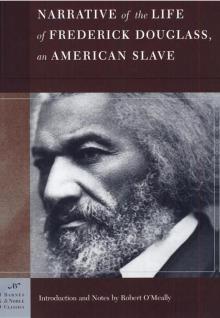 Narrative of the Life of Frederick Douglass: An American Slave
Narrative of the Life of Frederick Douglass: An American Slave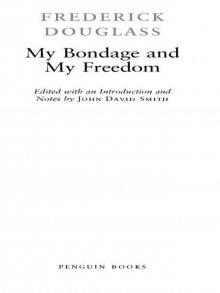 My Bondage and My Freedom
My Bondage and My Freedom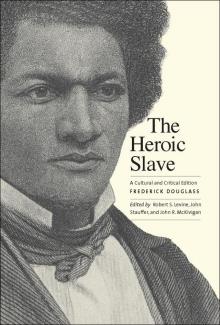 Two Slave Rebellions at Sea
Two Slave Rebellions at Sea The Color Line in America
The Color Line in America The Negro Exodus from the Gulf States
The Negro Exodus from the Gulf States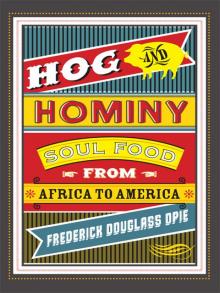 Hog and Hominy: Soul Food From Africa to America
Hog and Hominy: Soul Food From Africa to America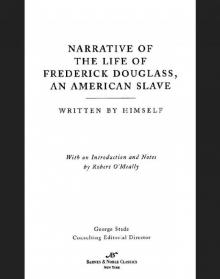 Narrative of the Life of Frederick Douglass
Narrative of the Life of Frederick Douglass![An Appeal to Congress for Impartial Suffrage [a machine-readable transcription] Read online](http://i1.bookreadfree.com/i/03/23/an_appeal_to_congress_for_impartial_suffrage_a_machine-readable_transcription_preview.jpg) An Appeal to Congress for Impartial Suffrage [a machine-readable transcription]
An Appeal to Congress for Impartial Suffrage [a machine-readable transcription] The Color Line
The Color Line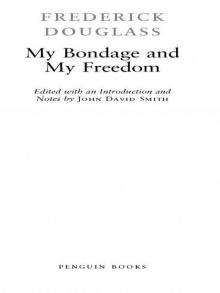 My Bondage and My Freedom (Penguin Classics)
My Bondage and My Freedom (Penguin Classics)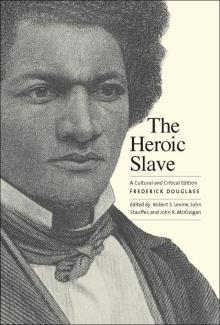 The Heroic Slave
The Heroic Slave